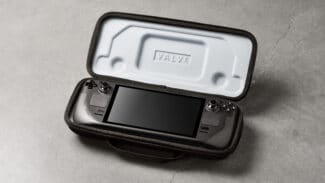Valve’s handheld gaming system is called Steam Deck and the company is pitching it as “an open PC” that can “connect with any hardware.”
The device will ship later this year with prices starting at $399. Valve says there will be a dock sold separately with an image for the accessory showing what looks like Displayport and USB ports, among others. The handheld itself is powered by a “custom APU developed with AMD” and Valve says it is “comparable to a gaming laptop with the ability to run the latest AAA games.” There’s obviously no mention of VR support from Valve in connection with Steam Deck — Valve specifically states the device is “optimized for hand-held gaming” — but we reached out to the company for comment on that prospect nonetheless given its pitch as an “open PC” and the likelihood that enthusiast buyers are likely to test out exactly what that means. Valve calls it “the first in a new category of handheld PC gaming devices.” IGN got access to Valve’s Pierre-Loup Griffais to ask whether it can run VR and Griffais replied “It has all the connectivity. You would need [a lot] to do that, but that’s not really what we’re optimizing the performance for.”
We’ve seen the Nintendo Switch turned into a cardboard-based VR headset and Facebook’s Quest runs on mobile-class chips at up to 120 Hz, but both of those are entirely different prospects from the high-end needs of PC VR games using SteamVR. Valve’s own Half-Life: Alyx, for example, needs a minimum of 12 GB of RAM with processors at or above a Core i5-7500 / Ryzen 5 1600 and GTX 1060 / RX 580 – 6GB VRAM. Still, there are reprojection methods and lower resolution settings that might conceivably close some of the gap in power needed to run VR from such a small PC.
Valve will offer reservations starting July 16th at 10 am Pacific with shipping slated to start in December of this year. You can find more information about the device over on Steam.






